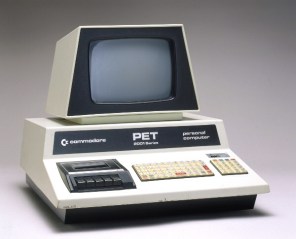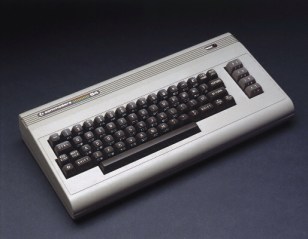Jack Tramiel (right) with Apple's Steve Wozniak in December 2007, prepping for a panel at the Computer History Museum in Mountain View, California.
The PC industry is so young that a remarkable percentage of its most significant figures are still with us. But it lost a key one on Sunday when Jack Tramiel, the founder of Commodore, died at 83. Commodore was one of the first important PC companies, and Tramiel, in his own idiosyncratic manner, played a vital role in getting the PC revolution underway.
He may have been less representative of the conventional stereotypes about computer entrepreneurs than anyone else who ever headed a major computer company. Born Jacek Trzmiel in Lodz, Poland, he was liberated by the U.S. Army from the concentration camp at Auschwitz during World War II. After the war, he joined the U.S. Army himself; in 1953, he used a GI loan to found Commodore, initially a typewriter repair company. (The name “Commodore,” he said, came about because he wanted one with military associations — but all the obvious monikers, such as Admiral and General, were taken.)
[FROM THE TIME ARCHIVE: In 1984, when Jack Tramiel bought Atari, we compared him to Pac-Man.]
Commodore eventually made LED watches (I’m wearing one now) and calculators before introducing the PET 2001 in 1977. Along with the Apple II and Radio Shack’s TRS-80, both of which were also introduced in 1977, the PET was one of the holy trinity of microcomputers that turned the PC from a nerdy hobbyist gizmo into a consumer product.

Getty Images
Tramiel was old enough to be the father of guys like Steve Jobs and Steve Wozniak and, as far as I know, was not a technologist or a geek of any sort. (Chuck Peddle, who designed both the PET and its microprocessor, the 6502, was the engineering genius who made Commodore’s initial success as a PC company possible.) In the early 1980s, he was already a middle-aged, tie-wearing cigar-chomping type who felt a bit like a figure from an earlier age.
I was in high school at the time and not a fan of Commodore’s computers; I dismissed Tramiel as a cranky, square old man. But when I saw him in person more than a quarter century later, at a Computer History Museum event which paired him with Woz — an improbable, entertaining combo — I was startled, and delighted, to find that he seemed to have barely aged or otherwise changed since the golden age of Commodore.
The PET was an important early computer, but the machine that Tramiel will be forever associated with is the Commodore 64. It was introduced in 1982, offered a crazy-generous 64KB of memory for a surprisingly low $595 and became one of the most popular computers in history. Wikipedia still says it’s the single best-selling PC model of all time; I think it’s possible that it no longer retains that honor, depending on how you define “PC” and “model.” But there’s no question that the Commodore 64 was a phenomenon in its day, and that it closely reflected Tramiel’s thinking.

Getty Images
He was, essentially, the anti-Steve Jobs: he wanted PCs to be very cheap and very utilitarian, and didn’t care in the slightest about elegance or technical sophistication. The C64 was cheap, utilitarian and inelegant — and for a good long while, that was a recipe for huge success. The rest of the industry was forced to slash prices to compete with Commodore, a trend that got PCs into lots of homes just when the idea of a PC in the home was getting exciting. (It also drove companies such as TI right out of the market.)
Commodore forced Tramiel to step down 1984, during a period when the home PC market was crashing. He then acquired Atari for a fire-sale price from Warner Communications and continued on being Jack Tramiel. The post-Tramiel Commodore released the Amiga and Tramiel’s Atari released the Atari ST line, and the two companies duked it out for years in the withering old-school home PC market. Neither made it into the new century as a manufacturer of PCs, and Tramiel mostly left the public eye.
It’s tempting to theorize that Commodore made an idiotic, self-destructive mistake when it sacked Tramiel, akin to Apple firing Steve Jobs. Well…probably not. In his own rough-edged way, Tramiel was a visionary of sorts back in the 1980s, but his visions of things to come weren’t terribly reliable. He was famous, for instance, for gloomily predicting a takeover of the PC market by “the Japanese.” The prospect clearly motivated Tramiel to work his brains out to keep Commodore competitive, but it never happened.
He was also a believer in vertical integration: Commodore did things like acquiring companies which made microprocessors and displays, allowing it to produce computers that were full of Commodore-made components. That sounds surprisingly similar to Apple’s current strategy, but at the time, it probably hurt Tramiel’s company, since the industry gravitated towards Intel processors, commodity parts and off-the-shelf Microsoft software.
Imagining Tramiel succeeding at anything as boring as building garden-variety IBM PC clones is tough…and in fact, his Atari did eventually try its hand at making mundane PC clones, and failed at it. But during the wild-and-woolly early days of the PC, Jack Tramiel helped to define what a PC was.
More important, he did as much as anyone to make PCs accessible to ordinary people. At that 2007 Computer History Museum event, he cheerfully — and accurately — recycled a once-famous line when he told Woz “You built computers for the classes — I built them for the masses.”
Bonus video:
In an early example of celebrity endorsement of a computer, Tramiel’s Commodore hired William Shatner to sing the praise of 1980’s VIC-20, a sort of proto-C64. (Shatner later admitted he knew nothing about PCs in general or the VIC-20 in particular.)
[youtube=http://www.youtube.com/watch?v=UK9VU1aJvTI]
Here’s a classic hard-sell Commodore commercial which seems to suggest that not owning a Commodore 64 is a recipe for life-ruining failure:
[youtube=http://www.youtube.com/watch?v=jDcZeGbElnM]
Here’s one knocking other computers, including Apple’s Apple IIe, as overpriced:
[youtube=http://www.youtube.com/watch?v=eHyPq6HsFPc]
And here’s Tramiel on a 1985 TV show talking about the first computers Atari released under his management.
[youtube=http://www.youtube.com/watch?v=NImJFV3wH88]


